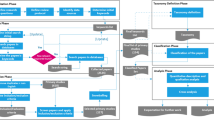Abstract
In this paper, we present a pattern-based software development method that preserves usability and security quality characteristics using a role-driven mapping of requirements analysis documents to architectural design artifacts. The quality characteristics usability and security are captured using specialized problem frames, which are patterns that serve to structure, characterize, and analyze a given software development problem. Each problem frame is equipped with a set of appropriate architectural styles and design patterns reflecting usability and security aspects. Instances of these architectural patterns constitute solutions of the initially given software development problem. We illustrate our approach by the example of a chat system.
Preview
Unable to display preview. Download preview PDF.
Similar content being viewed by others
References
Bass, L., Clements, P., Kazman, R.: Software Architecture in Practice. Addison-Wesley, Reading (1998)
Buschmann, F., Meunier, R., Rohnert, H., Sommerlad, P., Stal, M.: Pattern-Oriented Software Architecture: A System of Patterns. John Wiley & Sons, Chichester (1996)
Choppy, C., Heisel, M.: Une approache à base de patrons pour la spécification et le développement de systèmes d’information. In: Approches Formelles dans l’Assistance au Développement de Logiciels - AFADL (2004)
Chung, L., Nixon, B.A., Yu, E., Mylopoulus, J.: Non-Functional Requirements in Software Engineering. Kluwer Academic Publishers, Boston (2000)
Folmerand, E., van Welie, M., Bosch, J.: Bridging Patterns: An approach to bridge gaps between SE and HCI. Information and Software Technology 48(2), 69–98 (2006)
Gamma, E., Helm, R., Johnson, R., Vlissides, J.: Design Patterns – Elements of Reusable Object-Oriented Software. Addison Wesley, Reading (1995)
Hatebur, D., Heisel, M., Schmidt, H.: Pattern- and Component-Driven Security Engineering. Technical report, Universität Duisburg-Essen (2006), http://swe.uni-duisburg-essen.de/intern/seceng06.pdf
Hatebur, D., Heisel, M., Schmidt, H.: Security Engineering using Problem Frames. In: Müller, G. (ed.) ETRICS 2006. LNCS, vol. 3995, pp. 238–253. Springer, Heidelberg (2006)
Jackson, M.: Problem Frames. Analyzing and structuring software development problems. Addison-Wesley, Reading (2001)
van Welie, M.: Patterns in Interaction Design (2003-2006), Online catalogue for interaction design patterns, http://www.welie.com
A. Pfitzmann and M. Köhntopp. Anonymity, unobservability, and pseudonymity - a proposal for terminology. In H. Federrath, editor, Workshop on Design Issues in Anonymity and Unobservability, LNCS 2001 / 2009, pages 1–9. Springer-Verlag, 2000.
Robertson, S., Robertson, J.: Mastering the Requirements Process. Addison-Wesley, Reading (1999)
Schümmer, T.: A Pattern Approach for End-User Centered Groupware Development. PhD thesis, FernUniversität Hagen (2005)
Shaw, M., Garlan, S.: Software Architecture. Perspectives on an Emerging Discipline. Prentice Hall, Englewood Cliffs (1996)
Sommerville, I.: Software Engineering. Addison-Wesley, Reading (2001)
Tidwell, J.: Designing Interfaces. O’Reilly Media, Sebastopol (2005)
UML Revision Task Force. OMG Unified Modeling Language: Superstructure (August 2005), http://www.uml.org
Wentzlaff, I., Specker, M.: Pattern-Based Development of User-Friendly Web Applications. In: Proceedings of the 2nd International Workshop on Model-Driven Web Engineering (MDWE 2006), Palo Alto, USA, ACM, New York (2006)
Author information
Authors and Affiliations
Editor information
Editors and Affiliations
Rights and permissions
Copyright information
© 2006 Springer-Verlag Berlin Heidelberg
About this paper
Cite this paper
Schmidt, H., Wentzlaff, I. (2006). Preserving Software Quality Characteristics from Requirements Analysis to Architectural Design. In: Gruhn, V., Oquendo, F. (eds) Software Architecture. EWSA 2006. Lecture Notes in Computer Science, vol 4344. Springer, Berlin, Heidelberg. https://doi.org/10.1007/11966104_14
Download citation
DOI: https://doi.org/10.1007/11966104_14
Publisher Name: Springer, Berlin, Heidelberg
Print ISBN: 978-3-540-69271-3
Online ISBN: 978-3-540-69272-0
eBook Packages: Computer ScienceComputer Science (R0)




